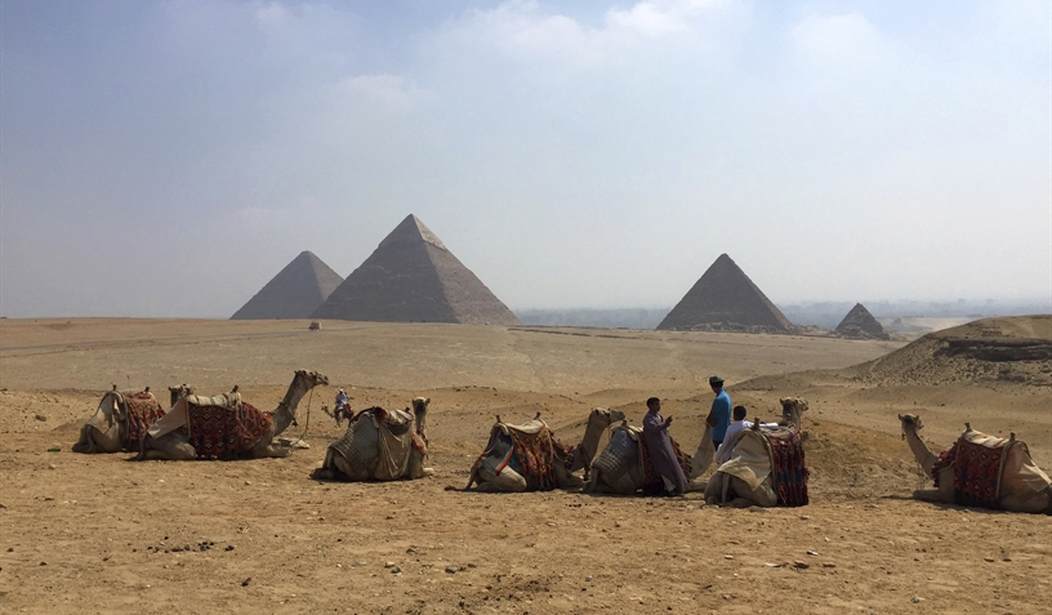?Growing up in a in a university town, I was exposed to a wide range of cultures. As faculty and graduate students came and went, there was a constant revolving door of people passing through. At the end of elementary school, a new student arrived in my class, her name was Nahla, and she was from Egypt.
As a son of an Israeli father, I will never forget the discomfort that I felt being around her. I had nothing against her personally, and in fact recall resisting liking her. I understood from my much earlier years that Israel and Egypt were enemies, and that they sought the destruction of Israel. As nice as Nahla may have been, and that maybe she only associated me with being a Jew and not an Israeli, it was innate not to trust her.
Whatever brought Nahla and her family to town, just like many of the other international students, she was there for a few years and then she left. But she left around the same time that my perspective on Egypt begin to change.
I will never forget chilly autumn day in 1977 as I sat with my father watching the most historic thing about which, until that point, I had awareness related to Israel’s survival. It was November 19.
The quickly planned visit of Egyptian President Anwar Sadat, the first Arab leader to visit Israel publicly, was incredibly exciting, and scary at the same time.
I was in middle school and certainly did not understand the range of geopolitical factors that had been taking place since the early 1970s, ultimately leading to this point. To me, Egypt was still an enemy, and as much as I sat there with enthusiastic optimism that maybe we’d have peace, I was terribly afraid that the Egyptian plane door would open, and terrorists would emerge, firing weapons at all of Israel’s leadership gathered on the tarmac.
Recommended
Thank God, after what felt like endless anticipation, all that emerged was a smiling President Sadat. Less than two years later, Israel and Egypt signed an unprecedented peace treaty, good for Israel and Egypt together. Two years after that, Sadat was assassinated by Islamic extremists on the anniversary of the Yom Kippur War. By making peace with Israel, he made enemies across the Arab and Islamic world.
For a variety of reasons, sadly, for decades Israel’s peace with Egypt has been one of practicality and mutual interests, but primarily on a government to government, or military to military basis. Many Israelis have visited Egypt, but the reverse has not been the case. While there were aspects of reconciliation, specifically between soldiers who had battled one another in the 1973 Yom Kippur War, for the most part peace did not trickle down to civilians. Nevertheless, even a cold peace is better than any kind of war.
It was important that Egypt recognized that, as well as recognizing Israel’s existence and right to do so. It would be 40 years (not an insignificant period Biblically vis a vis the Jewish people’s Exodus from Egypt), before the ice broke further, and the Abraham Accords paved the way for peace with four new Arab countries (in addition to Jordan which made peace in 1994). Perhaps, just like the two generations it took for the Jewish people to leave Egypt and return as free people to the Land of Israel, it also took two generations before Arab nations would feel free to follow what President Sadat started.
Almost 25 years to the day after Sadat’s assassination, I had the privilege of meeting and befriending an Egyptian diplomat stationed in Israel. We spoke openly about a range of topics, challenging one another from our different perspectives, but in friendship. In another unprecedented move, he became the first Arab diplomat to visit my Judean mountain community, pejoratively referred to as a “West Bank settlement.” Sometimes, ice thawing is not all bad or blamed on global warming.
Today, Israel’s relations with Egypt are warmer than they have ever been. This comes after a tense period during the thankfully short-lived leadership of the Islamist Moslem Brotherhood President Morsi. Albeit that there’s still a lack of peace between people, and still very much at the practical governmental and security level, relations have rebounded and even improved. Albeit on a different level because he’s not the first, President Abdel Fattah el-Sisi, seems to be improving on the playbook of President Sadat. This is in part because the Middle East has become more polarized with Islamic extremists challenging the more moderate nations. It is also clear that Israel is not only not an obstacle to peace, but a critical pillar of it. This was explained by my friend the Egyptian diplomat because Israel and Egypt in fact have the same enemies.
Maybe it’s just coincidence, but as then President Sadat arrived in Israel, the future and current President el-Sisi was celebrating his birthday, the former paving a path for the later. It seems that President el-Sisi knows who the bad guys are: Iran and it’s puppets, Turkey, etc.
For Jews and Israelis, Egypt is an inseparable part of our consciousness. It’s not just the wars we’ve fought, or the annual celebration of the Exodus at Passover. Our Biblical history in and with Egypt goes back to Abraham, Joseph, and hundreds of years of enslavement, placing Egypt on our radar regularly. Even when we observe Shabbat (the Sabbath) each week, we include a blessing over wine, reminding us of our exodus from Egypt.
It’s good to be out of Egypt, free people in our Land, and recognized by the largest Arab nation as an anchor and role model for others. I pray that the peace will warm and expand further, and that every November 19 we will have the privilege to look back on that historic day in 1977, from decades of respective peace and prosperity.

























Join the conversation as a VIP Member